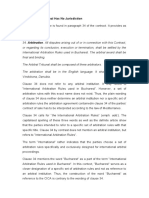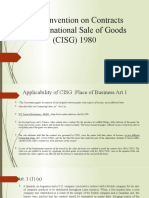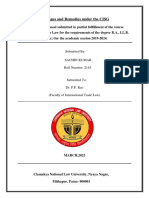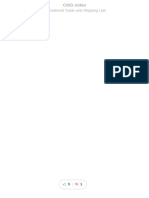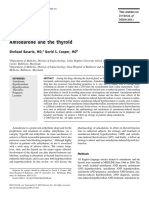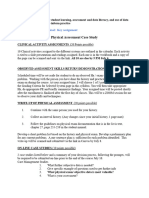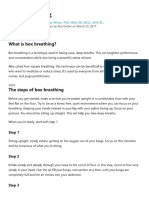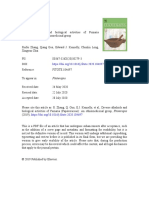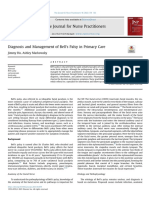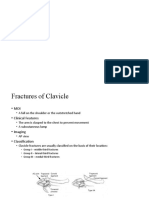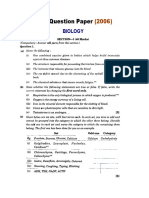MOOTING SCRIPT
Good morning Yang Arif. I am Fareez Aizack. I will be representing the Appellant in this case
Oops Media Sdn Bhd and Espada Daily. As Mr Azizul has submitted first and second grounds, I
will be submitting third grounds for this hearing of appeal in which I will break it in form of
three fundamentals. The issue under my grounds of appeal is whether Aizen is entitled to claim
damages for his injury, the cost of medical treatment, the cost of renting the apartment and
mental stress?.
iii) The breach of duty by the appellant did not cause the respondent’s damage to be suffered
seeing that he would still have some form of damage regardless of the breach..
Yang Arif, Moving on to the first fundamental of my submission under my grounds of appeal on
the point that The breach of duty by the appellant did not cause the respondent’s damage to be
suffered seeing that he would still have some form of damage regardless of the breach. This
principle has been established in the case of Barnett v Chelsea & Kensington Hospital
Management Committee
May I draw the attention of this tribunal to my first submission. FIRSTLY, there are two reasons
why CISG is applicable to CMI which are the choice of law in the agreement is CISG and as
CMI is in a contracting state. The agreement made between the CMI and our client stated clearly
in Clause 7 that the governing law shall be the United Nations Convention on Contracts for the
International Sales of Goods 1980 (CISG) and therefore the general rule is CISG will be
applicable to the first claimant. On the other hand, as in Article 1(1)(a) of the CISG, the
convention is applicable if both parties are Contracting States. Without a doubt, CMI is located
in Russia while Ryeno Technologies Ltd is located in the United States of America. The CISG is
in force in the Russian Federation on 1st September 1991 while it is in force in the United States
of America on 1st January 1988. Both parties are in contracting states which are the United
States of America and Russian Federation. Therefore, I am in agreement that CISG is applicable
to the first claimant, CMI, by virtue of Article 1(1)(a) of CISG.
However Mr/Mdm Arbitrator, the case is different for the second claimant. For my second
submission there are two reasons why CISG is not applicable here which are Clovaris Microgen
�Sdn Bhd is not in a contracting state and the United State of America has reserved the
application of CISG when one of the parties is a non-contracting state.
To reiterate, the applicability of CISG is based on Article 1 of the CISG. For Article 1(1)(a), the
CISG is only applicable when both parties to the contract are in different states and the states are
contracting states. This Article was applied in the case of Sure Skins s.n.c. v. South African
Wool, Hide & Skin Ltd whereby the buyer was an italian company and the seller was a south
african company. The principle laid down was that CISG was not applicable as only Italy was a
contracting state and Article 1(1)(a) could not be invoked. In the said case, the principle of
Article 1(1)(b) was also laid down whereby the private international rules of the forum
remanded, as applicable law, to the law of the seller (i.e., the law of South Africa). As such,
CISG is applicable under Article 1(1)(b) only when the rules of private international law lead to
the application of the law of a Contracting State. The second respondent place of business is in
Malaysia and Malaysia is not a contracting state of CISG. Article 1(1)(a) is only applicable when
parties of a contract are contracting states of CISG. Therefore, as per the first reason stated,
CISG is not applicable to the second respondent whereby Malaysia is not a contracting state of
CISG.
Mr/Mdm Arbitrator, moving on to the second reason, it is fruitful to see the position of the
United States of America when it comes to Article 1(1)(b) of CISG. The position was elaborated
in the case of Prime Start Ltd. v. Maher Forest Products Ltd. et al. It was stated that the
United States of America has invoked Article 95 of the CISG whereby "Any State may declare at
the time of the deposit of its instrument of ratification, acceptance, approval or accession that it
will not be bound by subparagraph (1)(b) of article 1 of this Convention." In other words, United
States of America has reserved Article 1(1)(b) of the CISG and as such, CISG is applicable when
both contracting parties are contracting parties of CISG. In another case of Impuls I.D.
International, S.L., Impuls I.D. Systems, Inc., and PSIAR, S.A. v. Psion Teklogix Inc.
whereby the case shares a similar principle that the United State of America rejected being
bound by Article 1(1)(b) of CISG and the only way for CISG to be applicable is when both
parties are contracting states.
�The present case is bound by the position taken by the United States of America regarding
reservation of Article 1(1)(b) of the CISG. It is undisputed that the choice of law in the
agreement is CISG as per clause 7. As CISG is governing the main contract, thus, parties of the
contract are bound by the position taken of contracting states in ratifying the CISG. As stated
earlier, United States of America has invoked Article 95 of the CISG, therefore, CISG is not
applicable to non-contracting states. Malaysia has yet to ratify the CISG and as such a non-
contracting state. In other words, because CISG is the governing law of contract and United
States of America has reserved Article 1(1)(b), CISG cannot be applicable to the second
claimant, Clovari Microgen Sdn Bhd where the place of business is in Malaysia.
To conclude, Mr/Mdm Arbitrator, CISG is applicable to the first claimant, CMI as according to
Clause 7 of the SPA and as Article 1(1)(a) of CISG whereby CMI is under contracting states.
Conversely, CISG is not applicable to the second claimant because Clovaris Microgen Sdn Bhd
is not under contracting states and Article 1(1)(b) is not applicable in this case as the United
States of America has reserved the said article.
� iv) Whether the Respondent breached Article 35 of the CISG for the delivery of the Plasma
freezers.
Moving on to the last issue, whether the Respondent breached Article 35 of the CISG for the
delivery of the Plasma freezers.
Mr/Madam Arbitrator, the answer for the last issue is in negative as the Respondent had not
breached Article 35 of the CISG for the delivery of the Plasma freezers.
With that being said, may I begin with my first submission. There are 2 reasons why respondent
had not breached article 35 which are the inconclusive outcome of investigation is not a
presumption of defects to the freezers and the freezers were fit for its intended purpose when it
is able to function without any repairs or alterations at the time of delivery.
As the formal investigation in this present case led to inconclusive conclusion, it would be
fruitful to make reference to the case of Mansonville Plastics (B.C.) Ltd. v. Kurtz GmbH,
whereby the cause of defects were unknown. The case is between Mansonville (the buyer) with
40 years experience in the industries and Kurtz (the seller) which has been in existence for over 2
centuries. The issue of the case is regarding equipment bought by Mansonville from Kurtz for
making styrofoam. Due to an unknown cause, the equipment failed to produce styrofoam
according to the standard. The court, in deciding the issue of conformity of goods, laid down a
principle that an equipment is not defective or unfit when the reasons of inability to function
remains a mystery. In other words, While the cause of the initial problems was unknown, it did
not allow a presumption of defect to be drawn.The court further stated that, as a matter of law,
the failure of the equipment to produce suitable styrofoam blocks does not establish that it was
not reasonably fit for that purpose. The court inferred that the equipment was fit for its intended
purpose when it is able to function without any repairs or alterations at the time of delivery. It
was decided that there is no breach of non-conformity of goods by the seller.
�Applying the principle of Mansonville Plastics’ to this present case, FIRSTLY, a formal
investigation was conducted and the outcome was inconclusive, among others, natural
biochemical defects or by technical malfunctions during storage and distribution. Hence, it can
be deduced that inconclusive outcome of investigation does not offer a presumption of defects
freezers. Meaning to say, the claimant should not presume that the cause of vaccine’s defects is
because of technical malfunction as the outcome of investigation was inconclusive.
To note, the respondent is a world-renowned electrical manufacturer and has a reputation as a top
freezer manufacturer which is famous for its durability and quality. On 21st February 2021
virtual meeting, the respondent was well aware of the temperature needed which was between -
60 C and -90 C as stated by the claimant. Furthermore, it was stated by the claimant in an email
dated 29th March 2021, the vaccines were extremely crucial to be timely and on track as to cater
the pandemic and at the same time to restrained the new highly infectious variant straint. The
respondent had taken such matters seriously by replying to the email on the same day and
agreeing to settle the outstanding issue of arbitration in the light of the grave pandemic situation.
As respondent had taken this urgent matter seriously, all freezers were ensured to be according to
temperature stated. The respondent had its teams on grounds to ensure everything is working
accordingly. Thus, this proved that the freezers were fit for its intended purpose when it is able to
function without any repairs or alterations at the time of delivery.
For my second submission, the Respondent had not breached Article 35 of the CISG for the
delivery of the Plasma freezers because there is little to no evidence to suggest that respondent
had breached Article 35.
This is based on the Arbitral Award by the Arbitration Institute of the Stockholm Chamber of
Commerce between People of Republic of China and People of Brazil on 5 April 2007. In
paragraph 143, Neil Kaplan stated that if there is no credible evidence to support the contention
that the goods delivered by Seller did not comply with the quality or description required by the
contract, the claim has to fail.
Indeed, there is nary evidence to suggest that the respondent had breached article 35. Instead, the
vaccines produced by the claimant itself are most probably defective. It is undisputed that the
�claimant is also a world-renowned multinational pharmaceutical company whose primary line of
production is flu vaccine. However, Covid-19 is not as normal as any flu since it has caused a
global pandemic. As a matter of fact, the efficacy and safety of the vaccine produced by claimant
had been questioned as around 2-5% of recipients experience one or more of severe and rare side
effects. If i may Mr/Madam Arbitrator, make reference to the Vaccine Safety Basics Module
Prepared by World Health Organization (WHO) in 2013. It is stated that one of the reasons for
rare side effects of vaccines is defects on the vaccine itself. A well-documented example of a
vaccine-associated adverse reaction is vaccine associated paralytic poliomyelitis (VAPP). This
occurred because of failure by the manufacturer to completely inactivate a lot of poliovirus
vaccine. It was further stated that change in temperature may affect the vaccine efficacy but not
causing rare side effects as in CureVac. In this present case, people who were inoculated by
CureVac experience one or more rare side effects.
It is fair to conclude that degradation of the vaccine would be most probably because of natural
biochemical defects rather than malfunctions of freezers. Therefore, there is no evidence to
suggest that respondent had breached article 35 of CISG for the delivery of plasma freezers, this
claim has to fail.
The Respondent pleads to this tribunal to decide this case in its favour. If I can no longer be of
any further assistance to this arbitral tribunal, I thank this court for its time and indulgence.





